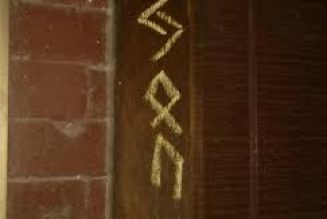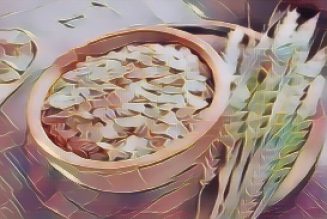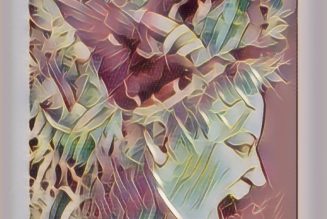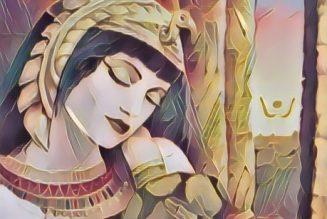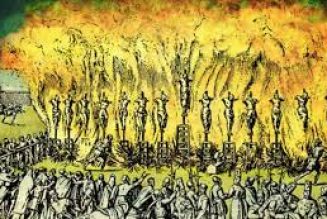Leshi has been known and honored as a woodland spirit or even Deity for centuries. Eastern Slavs call Him “Leshi”, “Lesovik” or “Lisovyk” (although the term Lesovik sometimes may refer to a slightly different woodland spirit), “Lyasun”, “Polisun”, “Visel”, “Blud”, “Lesun”, and sometimes even simply “Les” (Forest). Some also call Him Master of the Woods, Forest Father, Forest Uncle, Wild Man, Woodland Demon, and even Forest Saint and Forest Cherub.
The earliest time He was included in Slavic Divine Pantheon is XVIII century (Pantheon published by Popov, 1768). They say that even in XIX century, peasants claimed that Leshi was more likely to exist (more real to them) than monkeys: “My uncle and many other villagers said they encountered Leshi, yet none of them ever saw a monkey in their lives.” In the Carpathian Mountains, legends of Leshi mingle with the ones of a Bigfoot – Hutsul people call this spirit Chuhaister and believe He helps people find their way out of the woods and eats malevolent spirits like Nyavki.
He appears as “tall as the tallest tree in the woods” or “as short as the shortest weed”. He can take a form of any woodland animal or even a person: a man, a woman, or a child. However, whenever He assumes a human form, a watchful eye can tell this is no ordinary person, for He always has some defect that points out Him belonging to the Spirit world, such as absence of one (right) ear, eyebrows, or eyelashes, or a large wart that seems to be shifting all over His face, His eyes may appear crossed or have a strange green glow about them; His clothes has no buttons, and the edges of his shirt or coat are thrown right over left (normally it should be left over right on man’s clothes), or may be worn inside out or backwards. His long greenish-gray hair is always combed towards the left side. He may also be discovered if a man looks at Him over right ear of his horse. As many other spirits, Leshi does not wear a belt.
Bears and horned owls are His favorites. He may appear as a horned owl Himself or have one upon His shoulder, and his laughter sounds just like the cry of the horned owl. Poles even believe that Leshi takes a form of an owl sitting on an old tree and avoided cutting such trees down. Some Russians say, He could be found not on a tree but in a hole on an old tree: “In a hole in a tree you’d see an owl, or a Satan Himself”.
Magpies are considered His messengers, for they always make a lot of noise whenever they spot a human in the woods (to be honest, magpies also announce presence of other predators). Generally, all animals and everything in the woods, down to the smallest weed, obey to Him. This is why hunters and shepherds were considered magical people, for in order to provide a successful result of a hunt or keep all the domestic animals in the herd safe, they needed to make a pact with Leshi. Even the woodcutters could not cut a tree down in the woods without asking Him first, for in the woods He is absolute master.
Leshi travels on His own special trails, or the ones left by the animals, but no one could ever see His tracks, for the wind blows them over, or even if someone is lucky (or unlucky) to find them, he or she may be utterly confused, for He wears shoes on the wrong feet or sometimes even two left shoes on both of His feet.
Leshi is considered generally benevolent, although sometimes He is known to play pranks on people, especially those who come into the woods on the wrong time, without a blessing, or act negligent towards the forest. When one keeps circling in the forest and can’t find his or her way out, people say: “Leshi is leading him or her in a circle.” In order to confuse one on his path, Leshi only has to walk around that person in a circle. Sometimes, He may also scare people in the woods with mad laughter. To protect oneself from Leshi’s pranks, one needed to change himself according to Leshi’s way: twist all of his clothes inside out and put it on, and also switch shoes and put them on the wrong feet. Another way to break Leshi’s charms is for one to look in between his legs or say Leshi’s favorite saying: “I walked, I found, I lost.” Then Leshi is supposed to come out from behind the tree with words: “You figured it out!” and disappear after that. They also say that Leshi does not like salt and would never approach a fire to which salt was added. This may actually spur from Christian belief that all demons hate salt, for it is blessed in the church and used in Christian rituals (such as blessing of the water). An amulet against Leshi was “lutovka” – a basswood chip with no bark on. However, best protection against Leshi was knowing and respecting the “ways of the forest” (no wandering off if you don’t know where you are going, no following animal trails unless you’re a hunter, and of course, treating the forest and its inhabitants with respect – no dumping or cursing while in the woods!), as well as offerings: bread and two hard-boiled eggs, a gingerbread cookie, or a crepe. Actually, they say Leshi never forgives those who curse in His presence and sometimes takes away children who were cursed by their parents: “May Leshi take you!” They say that as soon as a woman in labor, exhausted from pain and effort says these words, her child immediately becomes property of Leshi, and He would take the child away as soon as the opportunity presents itself. These “kidnapped” children become His children, and if no one finds and blesses (or names) them within seven years, they may become malevolent spirits that lure passbyers, gatherers, and travelers into the woods to their death.
Vepss people (a Karelo-Finnish ethnicity in the Russian North) believe that Leshi needs to be thanked with food that bear prefers. Also, in the Russian North, woodcutters left little “notes” for “the Saint of the Woods” under the rowan tree – once they placed a branch of rowan and several rowan sticks against their heart.
Shepherds made “pacts” with Leshi by throwing a key and lock into the woods, in the hope that Leshi would use it to “lock” the herd in one place (or “lock” teeth to the wolves). This service was paid for with milk, and occasionally, a couple of cows. When a cow went missing, the shepherd or the mistress threw bread over the heads of remaining animals – this was an offering to Leshi in exchange for the missing cow.
Leshi was honored on certain holidays, such as Easter – peasants left an Easter egg on a woodland stump or at the crossroads of woodland trails (tentative date of the holiday uninfluenced by Christianity falls on April 4), Agafon’s Day (Leshi’s “Birthday”) – on this day He was believed to throw the sheaves of grain around if not paid proper respect, and His Farewell Day (October 4/17), when He was best not to be disturbed as He was getting ready for winter.
Leshi is normally envisioned as a solitary spirit. Two Leshis in one wood are believed to fight over their territory, although, according to Ukrainian beliefs, they may occasionally play a game of cards. The losing Leshi has to send His squirrels and hares into the forest of the winner (this is how Ukrainians explained mass migration of wild animals during a wildfire). In Russia, tales of mystical “battle of cards” of 1859 exist. They say that Western Russian and Siberian Leshis had a game of cards, and Siberian Leshi had to send a whole “army” of taiga hares over Ural Mountains into Western Russia.
Despite being a loner, Leshi is believed to have a wife – a hairy woman with tangled hair and breasts so large She needs to throw them over Her shoulders. Lesovichka (Leshi’s wife) is believed to have similar powers to Leshi, although tales about Her are not as common; however, her appearance is sometimes used to explain Leshi’s occasional liking for human girls and women (who were also considered more likely to be attacked by bears, and therefore avoided going in the woods alone or without offerings). Some also believed that Leshi could not marry a human woman unless she was cursed by her parents. Sometimes, Leshi is also believed to have a swamp Kikimora for a wife.
It is also believed that Leshi is afraid of calico cats, dogs that have a pair of light spots over their eyes (seer-dogs or Yarchuky), black roosters, as well as some other spirits, such as Domovoi and Bannik. He also rivals with Vodyanoi by trying to plant things in the water (Vodyanoi’s domain) and thus creating swamps.
One of the items associated with Leshi, aside from His traveler’s staff is the horn that Leshi uses to summon the woodland animals (in some tales, He just whistles instead). Generally, Leshi is not known to carry too many things with Him – at times, He may appear to mushroom pickers as another forager, holding a basket of mushrooms.
Good or evil, merciful or tricky, Leshi is the Forest, its very essence: good and bad, dangerous and resourceful. Let’s not forget this and respect the woods just as if they were a living being!
Let’s live in harmony with ourselves and Nature!














